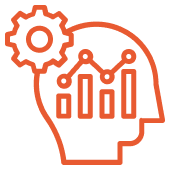The Common International Framework of Reference for Future Readiness (CIFR) for Job Seekers is a pioneering framework designed to equip individuals with the essential skills needed to excel in today’s dynamic workforce. Rooted in extensive research, this framework encompasses 45-50 critical skills that are indispensable for professionals and job seekers alike. These skills have been categorised into six core dimensions.

Leadership and Management Skills

Career Success Skills

Cognitive and Analytical Skills

Entrepreneurial and Business Skills

Digital and Technological Literacy

Communication in the workplace
The development of the CIFR for Job Seekers followed a two-phase process. The first phase involved identifying the skills that underpin future readiness for those entering or navigating the workforce. These skills were then organised into distinct dimensions, providing a clear roadmap for skill development. The second phase saw the creation of a comprehensive six-level scale, ranging from A1 (basic proficiency) to C2 (outstanding mastery). Each level is defined by specific 'can do' statements that clearly articulate the expected proficiency at each stage.
This structured approach allows job seekers to assess their current capabilities, identify areas for improvement, and work towards achieving higher levels of competence. The CIFR for Job Seekers not only helps individuals enhance their employability but also enables organisations to benchmark and support workforce development. With its robust and versatile framework, CIFR empowers individuals to thrive in a competitive job market while embracing lifelong learning and adaptability.
| Broad band | Level | General description | Score (in %) |
|---|---|---|---|
| Developing | A1 | You can perform simple tasks under supervision by following straightforward instructions. You manage basic tasks but find it challenging to adapt to new or unfamiliar situations independently. | < 25 |
| A2 | You can complete routine tasks independently using essential workplace skills. While you apply basic skills effectively, you may require support when handling unfamiliar challenges or adapting to new environments. | 26-50 | |
| Competent | B1 | You can complete routine tasks efficiently with minimal supervision. You can adapt well to familiar challenges and confidently apply practical skills in most workplace situations, demonstrating growing proficiency in your role. | 51-69 |
| B2 | You can handle complex tasks independently and approach challenges with confidence. You can solve problems effectively and contribute meaningfully to diverse professional situations, showing strong workplace skills and initiative. | 70-85 | |
| Outstanding | C1 | You can manage complex tasks with highly developed workplace skills. You can lead initiatives, make informed decisions, and implement improvements to effectively enhance team performance and organisational outcomes. | 86-95 |
| C2 | You can handle demanding tasks with precision and mentor others effectively. You can demonstrate innovative thinking and consistently achieve exceptional results, driving success in challenging and diverse professional settings. | 96-100 | |
The Common International Framework of Reference for Future Readiness (CIFR) for Job Seekers transcends the mere description of skills by establishing a comprehensive benchmark for assessing and enhancing workplace abilities. Designed to cater to individuals already in the workforce or seeking employment, the CIFR identifies critical skills across various dimensions, offering clear and measurable 'can-do' statements for each proficiency level.
For employers, the CIFR is an invaluable tool for identifying talent, assessing team skills, and aligning resources to the right roles. It helps organisations maximise productivity by ensuring the right people are placed in positions best suited to their abilities. For job seekers, the framework enables self-assessment, helping them understand their strengths and areas for improvement. By doing so, it guides them in choosing careers or roles that align with their potential and aspirations.
Furthermore, the CIFR can serve as a foundation for designing tailored assessment tools and industry-specific training programmes to bridge skill gaps and foster professional growth. By fostering a shared language of competence and readiness, the CIFR empowers both individuals and organisations to thrive in an increasingly dynamic job market.